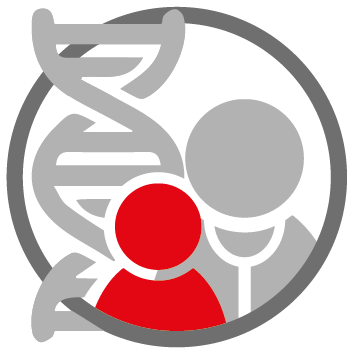Research Area: Ematologia e oncologia pediatrica - Terapia genica e trapianto di cellule ematopoietiche
Group Leader
The activity of the group is devoted to generating novel therapeutic paradigms and clinical translation of new platforms based on the use of genetically engineered hematopoietic cells in multiple disease areas:
i) inherited neurometabolic diseases of childhood: our group is historically focused on the development of novel treatment approaches for inborn errors of metabolisms affecting lysosomal function, namely lysosomal storage disorders, based on the use of hematopoietic stem and progenitors cells (HSPCs) and their myeloid progeny as vehicles for therapeutics in the central nervous system (CNS). Indeed, others and we have shown that the progeny of HSPCs can represent a vehicle for lysosomal enzyme delivery to the CNS upon transplantation in myeloablated hosts. The therapeutic potential of HSPC gene therapy in these conditions is based on HSPC ability to repopulate the myeloid compartment of the recipient, including microglia in the CNS, with a transplant-derived, mature progeny able to express therapeutic transcripts and exert neuro-immunomodulatory and neuroprotective functions. Indeed, the transplant progeny in the CNS recapitulates most of microglia functional features and can: a) attenuate or even reverse the detrimental effects of microglia activation response on other CNS cell types, such as neurons, thus mitigating CNS pathology; b) restore a physiological myeloid cell/microglia function, including efficient scavenging, within the CNS with the potential to clear accumulated debris and undegraded molecules, including storage material; c) provide a new effective source of therapeutic molecules, such as lysosomal enzymes for LSDs, within the CNS through the constitutive secretion ensured by efficient lentiviral vector (LV) based gene transfer; the functional protein could also be secreted and provided to neighboring cells. Moreover, the curative potential of this approach can be further enhanced by the use of optimized protocols for rapid reconstitution of myeloid cell populations in the brain and spinal cord by the transplanted cells/their progeny, and the combined delivery of neuroprotective and immunomodulatory molecules, such as Metallothioneins (MTs), for greater impact on the neurodegenerative and inflammatory/oxidative disease processes occurring in the LSD brain. Based on these considerations, our overall long-term objective is to develop to a clinical phase innovative HSPC gene therapy protocols for patients affected by severe neurodegenerative LSDs. Industrial alliances partially support these research projects.
ii) acquired neurodegenerative diseases: in the setting of a granted ERC project (ERC-2013-CoG #617162, HSC-based therapies for LSDs: understanding the modalities of cell replacement in the LSD brain for improving therapeutic efficacy) we aimed at identifying and understanding the modalities, time course and critical factors that affect microglia replacement following transplantation of HSPCs into murine models of LSD characterized by neurological deterioration. To this end, our group developed and optimized innovative transplant protocols to improve HSC engraftment in the brain, enhancing and accelerating microglia repopulation in recipient mice. We demonstrated that exclusive direct intra-cerebral ventricular (ICV) delivery of HSCs into myeloablated mice results in efficient and rapid microglia repopulation independently from HSC engraftment in the bone marrow and hematopoietic reconstitution, increasing the specificity, efficiency and therapeutic potential of this approach for chronic neurodegenerative diseases. We are thus applying this innovative approach to prototypical adult onset neurodegenerative conditions in which key genes involved in disease predisposition and onset have been identified. Among others, we are working on Frontotemporal Dementia (FTD) with the working hypothesis that achieving brain replacement of the lysosomal protein progranulin (GRN) is a rational therapeutic approach for familial FTD forms associated to GRN mutations.To ensure the successful application of HSC gene therapy to these conditions, we are also focused on more basic studies aimed at further unraveling the mechanisms of microglia maintenance in physiological and pathological conditions, as well as the modalities of myeloid cell/microglia replacement following HSPC transplantation. Goal is the development of translational protocols allowing selective and specific targeting and transplantation of populations with the potential of contributing to microglia turnover. Moreover, in this same setting regulated expression of therapeutic genes in mature microglia is being pursued by gene transfer and gene editing approaches. Industrial alliances partially support these research projects.
iii) autoimmune disorders: the use of autologous hematopoietic cell transplantation (HCT) has been widely explored in the context of randomized multicenter clinical trials as a treatment option for autoimmune diseases, such as multiple sclerosis (MS) and type 1 diabetes (T1D). The aim behind this approach resides within the immunoregulatory properties of HSPCsand it is based on the possibility to permanently reprogram an auto-aggressive immune system towards a de novo self-tolerant immune repertoire by HSPC transplantation. Indeed, the expansion and reinfusion of autologous HSPCs was demonstrated to be a potent therapy in reverting hyperglycemia in T1D patients, while several data demonstrate that adoptive transfer of HSPCs, either in pharmacologically conditioned or unconditioned MS subjects allows the homing of immune-modulatory cells in the affected areas of the CNS. In this context, the evidence on the role of the immune-regulatory factor programmed death-ligand 1 (PD-L1) in HSPC immunobiology has opened the possibility to establish novel therapeutic strategies based on PD-L1 expression in HSPCs to treat autoimmune diseases as MS and T1D.Considering both the common autoimmune mechanisms underlying T1D and MS, and the role of the PD-1/PD-L1 axis in both diseases, the improvement of immuno-regulatory properties of HSPCs by expression of PD-L1 may result in a therapeutic benefit in MS and T1D upon transplantation. Our preliminary data in T1D and MS animal models provide support for this concept. In the setting of Sponsored research programs with Altheia Science, a spin-off of the University of Padua, we are developing this concept in the setting of translational studies.
iv) pediatric cancer, namely AML and neuroblastoma: collaborative projects have been established within our Division combining the local unique expertise in pediatric oncology, advanced diagnostics and target discovery with the HC gene transfer and gene therapy expertise of the Biffi’s group. These projects are devoted to exploring the possibility of identifying and targeting unique surface tumor antigens by cell-based immunotherapy. An exploratory project has begun on pediatric AML together with Dr Pigazzi, where newly discovered AML-specific antigens were identified and are now being targeted. Similarly, thanks to a group effort and the financial support from patients’ associations, a novel project involving Dr Aveic for target discovery in the bone marrow metastatic niche of neuroblastoma was recently activated.
v) β-hemoglobinopathies, namely β-Thalassemia and Sickle Cell Disease: HSPC gene therapy is an extremely promising approach for these conditions. Dr Poletti in our laboratory is exploring an original, forward-looking gene therapy strategy for β-globin defects based on a non-viral approach, with a solid potential for clinical efficacy and translation, with a strategic design to maximize accessibility to the multitude of neglected children born with these lethal and devastating diseases in the poorest, and most affected, countries. See link to subarea.
Group Members
Valentina Poletti, Senior scientist
Rita Milazzo, Senior scientist (Altheia Science senior researcher)
Yuri Ciervo, Post-Doctoral Fellows
Giulia Santinon, Post-Doctoral Fellows
Silvia Spadini, PhD Student
Giovanni Faggin, PhD Student
Andrea Costa, Post-graduate Fellows
Massimo Accardo, Lab manager
Laura Rigon, Technician
Laura Gioiosa, Animal behavior technician
Vita Fedele, Alliance manager
Selected Publications
Kim J, Hu C, Moufawad El Achkar C, Black LE, Douville J, Larson A, Pendergast MK, Goldkind SF, Lee EA, Kuniholm A, Soucy A, Vaze J, Belur NR, Fredriksen K, Stojkovska I, Tsytsykova A, Armant M, DiDonato RL, Choi J, Cornelissen L, Pereira LM, Augustine EF, Genetti CA, Dies K, Barton B, Williams L, Goodlett BD, Riley BL, Pasternak A, Berry ER, Pflock KA, Chu S, Reed C, Tyndall K, Agrawal PB, Beggs AH, Grant PE, Urion DK, Snyder RO, Waisbren SE, Poduri A, Park PJ, Patterson A, Biffi A, Mazzulli JR, Bodamer O, Berde CB, Yu TW. Patient-Customized Oligonucleotide Therapy for a Rare Genetic Disease. N Engl J Med. 2019 Oct 24;381(17):1644-1652;
Pellin D, Loperfido M, Baricordi C, Wolock SL, Montepeloso A, Weinberg OK, Biffi A, Klein AM, Biasco L. A comprehensive single cell transcriptional landscape of human hematopoietic progenitors. Nat Commun. 2019 Jun 3;10(1):2395;
Wu Y, Zeng J, Roscoe BP, Liu P, Yao Q, Lazzarotto CR, Clement K, Cole MA, Luk K, Baricordi C, Shen AH, Ren C, Esrick EB, Manis JP, Dorfman DM, Williams DA, Biffi A, Brugnara C, Biasco L, Brendel C, Pinello L, Tsai SQ, Wolfe SA, Bauer DE. Highly efficient therapeutic gene editing of human hematopoietic stem cells. Nat Med. 2019 May;25(5):776-783;
Biffi A. Gene Therapy as a Curative Option for β-Thalassemia. N Engl J Med. 2018 Apr 19;378(16):1551-1552;
Esrick EB, Manis JP, Daley H, Baricordi C, Trébéden-Negre H, Pierciey FJ, Armant M, Nikiforow S, Heeney MM, London WB, Biasco L, Asmal M, Williams DA, Biffi A. Successful hematopoietic stem cell mobilization and apheresis collection using plerixafor alone in sickle cell patients. Blood Adv. 2018 Oct 9;2(19):2505-2512;
Capotondo A, Milazzo R, Garcia-Manteiga JM, Cavalca E, Montepeloso A, Garrison BS, Peviani M, Rossi DJ, Biffi A. Intracerebroventricular delivery of hematopoietic progenitors results in rapid and robust engraftment of microglia-like cells. Sci Adv. 2017 Dec 6;3(12):e1701211;
Gong Y, Sasidharan N, Laheji F, Frosch M, Musolino P, Tanzi R, Kim DY, Biffi A, El Khoury J, Eichler F. Microglial dysfunction as a key pathological change in adrenomyeloneuropathy. Ann Neurol. 2017 Nov;82(5):813-827;
Sessa M, Lorioli L, Fumagalli F, Acquati S, Redaelli D, Baldoli C, Canale S, Lopez ID, Morena F, Calabria A, Fiori R, Silvani P, Rancoita PM, Gabaldo M, Benedicenti F, Antonioli G, Assanelli A, Cicalese MP, Del Carro U, Sora MG, Martino S, Quattrini A, Montini E, Di Serio C, Ciceri F, Roncarolo MG, Aiuti A, Naldini L, Biffi A. Lentiviral haemopoietic stem-cell gene therapy in early-onset metachromatic leukodystrophy: an ad-hoc analysis of a non-randomised, open-label, phase 1/2 trial. Lancet. 2016 Jul 30;388(10043):476-87;
Biffi A, Montini E, Lorioli L, Cesani M, Fumagalli F, Plati T, Baldoli C, Martino S, Calabria A, Canale S, Benedicenti F, Vallanti G, Biasco L, Leo S, Kabbara N, Zanetti G, Rizzo WB, Mehta NA, Cicalese MP, Casiraghi M, Boelens JJ, Del Carro U, Dow DJ, Schmidt M, Assanelli A, Neduva V, Di Serio C, Stupka E, Gardner J, von Kalle C, Bordignon C, Ciceri F, Rovelli A, Roncarolo MG, Aiuti A, Sessa M, Naldini L. Lentiviral hematopoietic stem cell gene therapy benefits metachromatic leukodystrophy. Science. 2013 Aug 23;341(6148):1233158;
Aiuti A, Biasco L, Scaramuzza S, Ferrua F, Cicalese MP, Baricordi C, Dionisio F, Calabria A, Giannelli S, Castiello MC, Bosticardo M, Evangelio C, Assanelli A, Casiraghi M, Di Nunzio S, Callegaro L, Benati C, Rizzardi P, Pellin D, Di Serio C, Schmidt M, Von Kalle C, Gardner J, Mehta N, Neduva V, Dow DJ, Galy A, Miniero R, Finocchi A, Metin A, Banerjee PP, Orange JS, Galimberti S, Valsecchi MG, Biffi A, Montini E, Villa A, Ciceri F, Roncarolo MG, Naldini L. Lentiviral hematopoietic stem cell gene therapy in patients with Wiskott-Aldrich syndrome. Science. 2013 Aug 23;341(6148):1233151.
Sub-areas
Contatti

Corso Stati Uniti, 4 F
35127 Padova
Phone: +39 049 9640111
Fax: +39 049 9640101
info@irpcds.org
Orario di apertura: lun-ven 8:30 – 17:30




